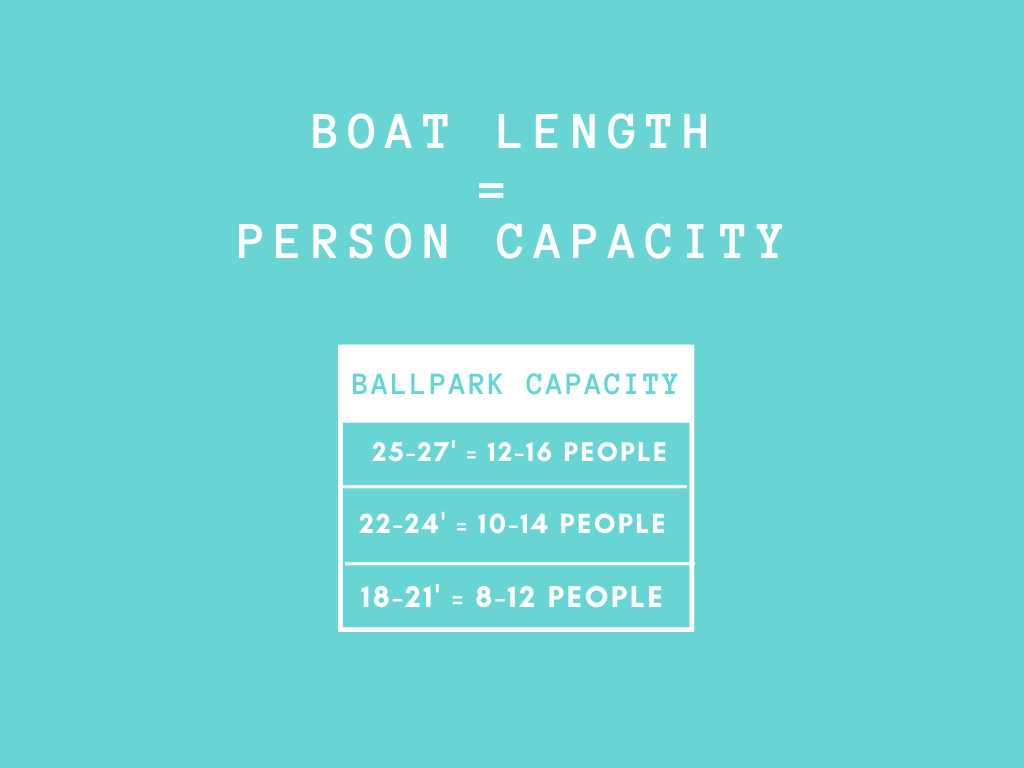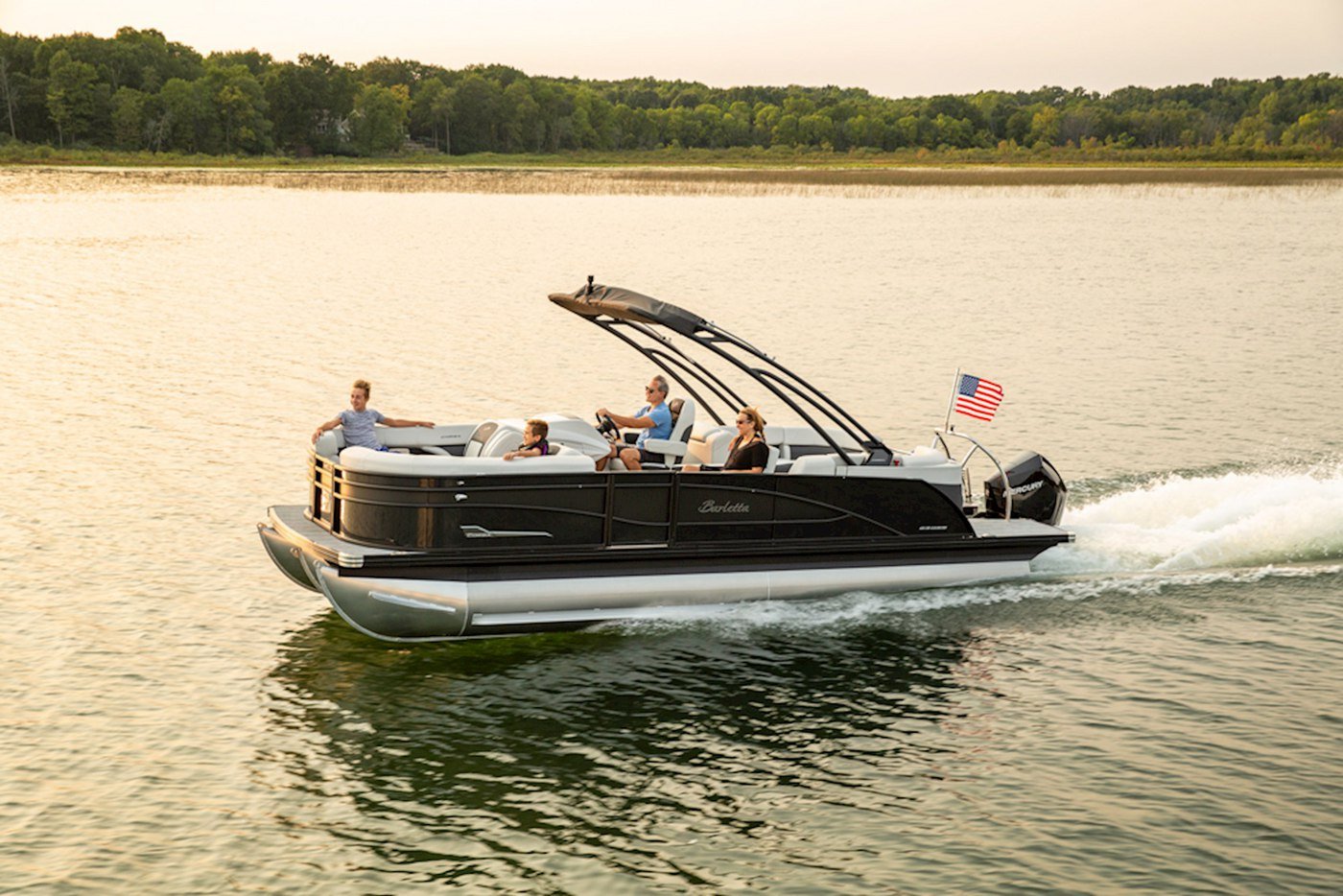How to Choose the Right Pontoon Boat Length for You
Spring is in the air, the sun is starting to poke out, and it’s time to make summer plans. If you have to be stuck at home, wouldn’t it be nice to be cruising at sunset and diving into the lake to cool off?
Yes, the answer is yes, trust me. As a long-time boater, I feel as though there’s no better way to spend summer than on a pontoon boat.
If you’re researching this option and have found yourself here, let’s talk about a few shopping decisions you have to make before you can pull the pontoon trigger.
While you shop, you should start by narrowing down a brand, a class, and then a floorplan you want to buy. Next, you must decide what length is best for you.
You may be surprised to find that, on average, there are only 10 length choices to pick from. When you look at it that way, choosing which length of a pontoon boat to buy is not so overwhelming.
Depending on the manufacturer you are researching, you may be presented with even fewer options than that. So how do you choose?
Let’s break down the most important elements to deciding which length is right for you.
How to Determine True Length
First, it’s important to know the differences between a couple of lengths offered. Most manufacturers will give you the deck length and the tube length to work with.
Both deck and tube lengths are exactly what they sound like. The length of the deck will be longer than the tubes as it does extend out over the tubes.
That said, every manufacturer is different in how they designate their models. For example, here at Barletta, we create model designations based on the tube length of the boat.
So, the L23U has a tube length of 23’6’’ and a deck length of 25’6’’. These are important figures to know, but the boat will be longer still.
Some manufacturers, like Barletta, have a transom on the back of the boat that will stick out further than both the tubes and the deck. You then have to figure in the outboard engine to get the overall length of the boat.
Depending on the make and model of the engine, it could add 2-3’ to the boat itself. So, for instance, on my L25UC, I’ve got a deck length of 27’6,’’ but the entire length of the boat and engine are right around 29’.
Although the deck length will help you determine the overall length of the boat when all is said and done, it’s important to know the tube length for reasons such as buying the appropriate pontoon trailer or boat lift.
As I mentioned, all manufacturers will vary slightly in how they calculate total length, so make sure to do your research while shopping different brands.
Buy the Boat Before you Build the Dock
Before you buy a pontoon boat, before you even build one online, you must know how much space you have to park and store the boat.
Too many times, we’ve seen owners so excited to purchase their new boat, they buy one that’s too long for their pier, boat lift, or boathouse. This is avoidable and should not be an afterthought while shopping for a new pontoon boat.
This is not only important for where you park the boat, but also for storage purposes. I’m a lifelong boater, and I have to admit, my newest pontoon boat is too tall for the storage facility I use in the off-season.
Luckily, I found this out just before we backed the boat and trailer into the building. Learn from me, make sure your measurements check out before you buy. Don’t base this decision on the model designator, as explained above.
The deck length of the pontoon boat might fit perfectly at your pier or storage unit, but don’t forget that engine. As I mentioned above, the outboard engine will add around 2-3’ to the overall length of the boat.
Another important thing to take into consideration for storage purposes is the overall length of the trailer. If you plan to tow and store the boat yourself, make sure the overall length of the trailer and boat will fit into your storage unit.
That leads me to my next point, if you’re planning on towing the boat yourself, make sure you are fully equipped to do so before you buy. You should never exceed your vehicle’s tow capacity and make sure you have the appropriate size trailer for the length of your boat.
There are pontoon boat trailers for all lengths, so make sure to do your research. The last thing you want is to purchase a trailer that’s too short for your pontoon boat, as this makes for a dangerous towing scenario.
How Much Capacity Do You Need?
The length of the pontoons and the capacity onboard go hand in hand. The longer the boat, typically the more capacity you will get.
This is true because a longer boat is heavier, which means it’s displacing more water than a shorter, lighter pontoon boat. The displacement of water is what gives it buoyancy and determines the weight capacity on board.
That said when looking to choose which length of pontoon you are going to buy, keep in mind how many people you will regularly have with you on the boat. This will be one of the most important factors in picking a particular length.
The longer the boat, the more seating you get, and with that, you also get more storage. More seating will make everyone on board more comfortable even if it’s just a few people. They can sprawl out and lounge easier with more seating.
It’s important to know that every brand is different so there’s not a set rule on what length equals what capacity. The most common lengths offered are 20-25’ pontoon boats.
Here are some ballpark lengths as they equate to person capacity to give you a general idea of where you will need to fall based on the number of people you boat with.

Most manufacturers offer options within these ranges depending on what type of pontoon you’re looking at.
Something to keep in mind is that the weight capacity is what should be taken into consideration over person capacity. A family of four that includes two adults and two children will weigh less than a boat with four adults.
That said, it’s imperative to take the overall weight onboard into consideration if you think you’re near the max capacity. Consider the gear onboard such as loaded down coolers and accessories as well as the people.
It is dangerous and illegal to exceed the boat’s weight capacity. If you think you’ll be near the maximum with your crew, you might want to look at purchasing a longer pontoon boat.
Body of Water
Where you boat should be another consideration factor in determining what size pontoon to buy. The body of water you boat on can have a great impact on how your boat performs depending on its size.
There are two ways to look at this. You don’t want to be stuck on a small body of water with a large boat that takes up so much space you have a hard time navigating.
In the same sense, you don’t want to be caught on a large body of water in a small boat. The bigger the water, the more chop you will endure. That’s why a longer pontoon boat will be a sturdier and safer option in this situation.
This is also true in regards to horsepower in relation to the length of the boat. The longer the boat, the higher the horsepower options available.
This is true because most manufacturers will cap the amount of horsepower you can put on smaller pontoon boats. They do this because some pontoon types cannot facilitate high-powered engines and it would be unsafe for the customer.
With longer pontoons, you can add high horsepower engines which are conducive if you boat on big water.
Think about how much lake area you have. If you’re on a smaller lake and only have short distances to travel, a shorter pontoon with a smaller engine might be the right choice for you.
You may also want to check to see if there are any size restrictions on your water. Sometimes depending on local and state laws, there can be size restrictions on the boat length and engine size.
Knowing the body of water where you boat can play a big part in deciding which pontoon to buy. Luckily, there is a floorplan for just about any type of water.
Go Big or Go Home
If you’re contemplating rounding up on the size of pontoon you want to buy, I personally recommend it. Although a short pontoon might be all you need, there are a few things to consider if you’re on the fence.
Two feet may not sound like a lot, but it makes a huge difference in the length of a pontoon boat. An extra two feet can give you more person capacity, more seating, more storage, and more deck space to move around.
The extra length can also be a big help if you encounter large waves, heavy winds, and long stretches where you boat. And of course, if you’re going with a fast engine, you should opt for a longer floorplan.
If you’re planning on leveling up from what you originally thought you were going to purchase, make sure to be prepared. Measure your docking and storage space ahead of buying the boat.
Make sure your tow vehicle can handle the extra weight and you’re prepared to potentially purchase a longer trailer.
If you are interested in learning more about the types of floorplans offered, build a pontoon online, it’s a great way to know what you will be getting from a longer pontoon boat.
Helpful Articles



.png?width=700&name=BUILD%20(2).png)